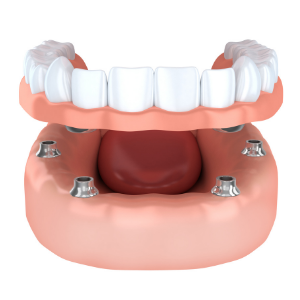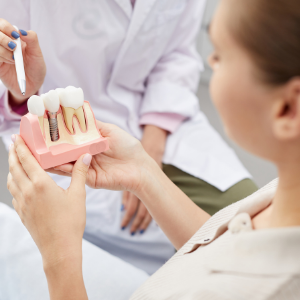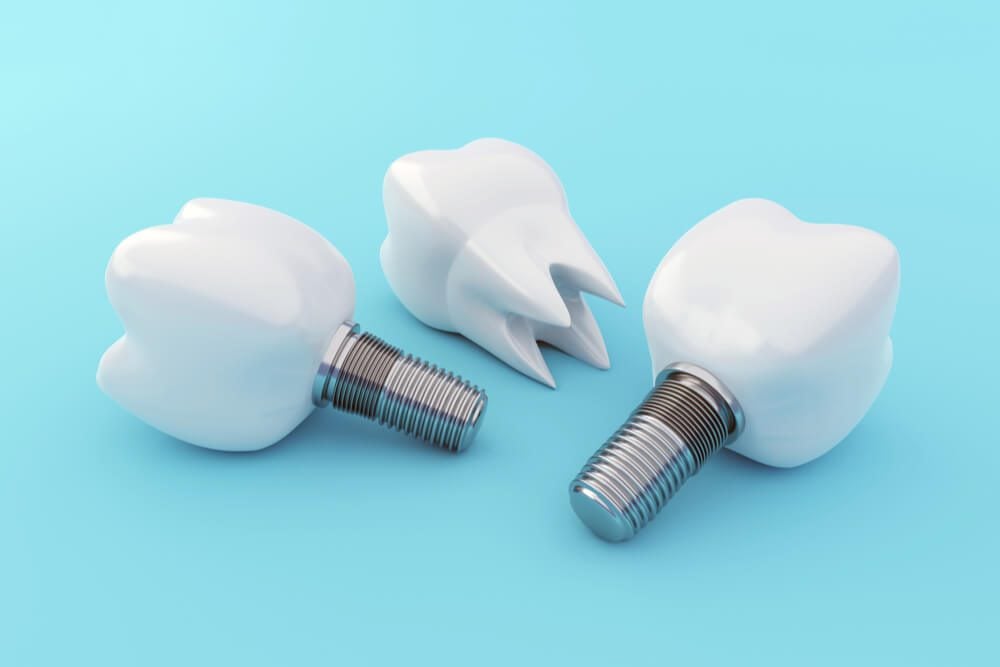What is a dental implant?
Dental implants are a type of dental prosthesis to replace a missing tooth or missing teeth.
They have a screw portion that gets inserted into the jaw that undergoes a natural process of osseointegration.
Osseointegration is when the dental implant fuses with the bone to create a very stable structure.
The abutment is cemented on the implant, and then the dental crown is placed on the abutment.
Most patients believe a dental implant is all three components when, in reality, the implant is only the titanium screw that gets inserted into the jaw.
Dental implants are becoming more and more common, and there are predictions that by the year 2026, nearly 23% of patients will have received a dental implant.
Dental implants are one of the most challenging dental replacement prosthesis, but, if done correctly, can give patients the best long term result.
How much do dental implants cost?
Dental implants have a wide range of costs, but, on average, they can be anywhere from $3,000 to $5,000 per tooth. This would include the implant, abutment, and crown.
Many patients also need a bone graft. A bone graft will cost an additional $300 to $600 per tooth location.
Implants cost a lot of money but can be a long-term solution and often requires less maintenance and better longevity than any other tooth-replacement option.
At Thrive Dental, we are offering a $2700 Dental Implant Special! Take advtange of this limited time offer to replace missing teeth. And get only the most trusted dental implants of highest quality for long-term success.
Standard dental implant costs
Many advertisements show dental implants to cost $1000 or less. These ads are often just for the dental implant and will not include the abutment and crown. The price will likely not include bone graft or any anesthesia.
There are a wide variety of factors that go into dental implant pricing. The costs involved are the implant’s cost, office overhead, doctors’ knowledge, type of material used, location, etc.
Depending on the severity of your case, you can expect to pay anywhere from $2700 to $3500 at Thrive Dental and Orthodontics.
On average dental implants will cost anywhere from $3000 to $5000 per tooth.
Same-day dental implants costs
According to multiple studies, same-day dental implants may be successful but results still are not clear. This is a less conventional method of placing implants.
This implant may also be known as
- Teeth in a day
- Same-day smile
- Immediate dental implants.
The price range is anywhere from $3000-$6000 per tooth.
All-on-4 dental implants

All-on-4 Dental implants is a trademarked procedure that involves placing 4-6 implants and securing them to a denture.
The implants are typically secured to a fixed denture but can also be placed below a removable denture.
The fixed denture can only be removed by your dentist whereas the removable denture can be removed by the patient to aid in cleanliness.
The average cost of an All-on-4 Dental implant system is anywhere from $10 000 to $30 000 per arch.
Why are dental implants so expensive?
Dental implants are the gold standard for tooth replacement, but the price is higher than a temporary flipper or other dental prostheses.
Dental implants are more than a partial denture or flipper because of:
- The dentist needs the expertise to place the implant. Most dentists do not have the skill to place implants. Placing dental implants takes extra training and knowledge. Most dentists have undergone extensive training to be proficient at placing implants.
- The cost of material is high for great quality implants. If you are placing an object into your body, you must have high-quality material, or else you can have serious health consequences. Most implants are made of medical-grade titanium to obtain proper osseointegration
- The many steps needed to fabricate a quality implant and crown. The lab work required to obtain an excellent result for your dental implant is more involved than most dental procedures
- Most dental implants involve multiple steps and visits. Many dentists will place the implants and then wait three months before placing the abutment and crown.
Dental implant procedures: before, during, and after your dental implant
Before the procedure
Your dentist will evaluate your tooth to determine if a root canal can save it or if it needs to be extracted and replaced with a dental implant.
The dentist will evaluate the area with X-rays, Panoramic X-rays, and occasionally a cone beam CT scan. They will determine the health of the bone and if you need a bone graft.
The dentist may also take an impression of your teeth to determine the best treatment plan.
Sedation and treatment options will be discussed at this time. Many patients can perform the procedure with just local anesthetic and mild sedation.
Financial discussions will be made at this time to determine your patient portion and if insurance can be utilized.
The dentist may also extract the tooth at this visit in preparation for the dental implant procedure.
During the procedure
The dentist will have either already extracted the tooth or will be pulling it at this visit. If you have healthy gums, the dentist may want to remove the tooth and place the implant the same day.
If your gum and bone level are not adequate, the dentist will extract the tooth and wait three months before placing an implant.
When placing the implant, the dentist will drill a small hole into your jaw and then screw in the implant and add bone graft if needed.
If the tooth is in an esthetic area, your dentist will give you a temporary fake tooth.
Some dentists may even place your abutment and crown on the same day. Although this is rarer, it may save you many months in total treatment time.
If the tooth is in a posterior area, you will leave with a healing abutment to ensure proper implant implementation.
After the procedure
The implant typically takes 2-4 months to integrate properly into the bone.
At this time, you will need to get impressions so the final crown and abutment can be fabricated.
An abutment is the piece of the prosthesis that connects the implant to the final crown restoration.
Once the crown is ready, the healing abutment will be removed, and the final abutment placed as well as the permanent crown. The dental crown will be checked for esthetics and occlusion.
Implants and dental insurance

Are implants covered under dental insurance?
Typically dental insurance does not cover implants as they view the procedure as cosmetic. If they cover the implants, they may cover $1000-$2000 of the total cost as this is the standard yearly maximum for dental insurance.
In the end, it is your insurance company that determines coverage. You may want to consult with them regarding coverage amounts.
Many offices, such as ours, will discount the implant’s overall price if it is all paid upfront.
There are also payment options and third-party vendors such as Care Credit that offer longer-term financing.
Will medical insurance cover dental implants?
Few medical plans would cover dental implants unless a severe injury caused damage to your mouth. Check with your medical plan company to determine if they offer any coverage.
It will still be challenging to find a dentist who will accept medical insurance for a dental procedure.
You may want to ask for the dental codes and file them yourself with your medical insurance provider.
Medicare plans may cover dental implants. It is difficult to find providers who accept adult medicare insurance plans and also place implants. Contact your medicare plan company for further information.
How to financially plan for your dental implant?
Dental implants can be costly. It is important to have a plan in place to be able to afford the procedure. Below are a couple of methods to prepare for the cost.
- Many companies and individuals have HSA or FSA amounts that can be used for dental procedures. This can cover some or all of the dental procedures.
- Request a full copy of your dental plan coverage to verify if you have any dental plan coverage. Sometimes your dental plan will be hard to understand. You may want your dental office to explain your specific benefits.
- Evaluate if there are any in-office payment plans or pay in full discounts as we do at Thrive Dental.
- Apply for CareCredit and make sure your dental office accepts that payment. Evaluate what your budget is and if a dental implant fits into that budget.
- If you are getting a tooth extracted, make sure to get a bone graft at that time, even if you are not getting an implant right away. This will save you money as the implant procedure will be easier and less costly with a previously placed bone graft.

Cheap dental implants near me
We sometimes see dental implant ads for $999 or less. Are these cheap dental implant ads legitimate?
These ads for cheap dental implants are often very misleading as they do not include the abutment, anesthesia, crown, and bone graft. You may be left with a massive bill if those items are not included.
That being said, there are times when newer offices offer excellent deals, so make sure to ask a lot of questions.
Check their online reviews, patient testimonials, and ensure that everything is included.
Remember, if it seems too good to be true, it likely is.
How long do dental implants last?
Many dental implants can last 15 years or more. Many patients who receive implants are 55 years and older, and the implants can last their entire lives.
What are the benefits of dental implants?
- You do not need to damage adjacent teeth if you are placing an implant as you would if you wanted a dental bridge.
- Dental implants are very esthetic and can feel similar to your natural teeth.
- Dental implants typically last longer than other restorations if adequately maintained.
- Unlike partial dentures, implants are not removable and, therefore, more comfortable.
What are the disadvantages of dental implants?
- The cost is higher than a bridge or removable appliance.
- The total time to finalize a dental implant is 4-12 months, depending on the treatment process.
- The implant could fail and not osseointegrate. In that case, you would need to remove the implant, let it heal, and try again.
Who is the right candidate for a dental implant?
If you are healthy, have good periodontal health, and have a few missing teeth, you may be a great candidate for dental implants.
Who is the wrong candidate for dental implants?
Many people may not be suitable for patients for dental implants. If you have one or more of the following, you may not be the right candidate for implants.
- Diabetes
- Smoker
- Blood clotting condition
- Leukemia
- Osteoporosis or bone conditions
- Under the age of 20
What are my options for a temporary tooth?
While your dentist is waiting for your implant to integrate into your bone, they will likely offer a few options to replace your tooth temporarily if needed.
- Essix style retainer. These are clear retainers that can have teeth added to them, think Invisalign style clear trays.
- A temporary crown can be added to the implant until a final restoration is ready.
- A dental flipper is a removable device that looks very similar to a partial denture.

How to choose a dentist for my dental implant?
The best method is word of mouth. If you have a friend or relative that received an implant and had a great experience, try that dentist.
We have excellent dentists at Thrive Dental and Orthodontics that are incredibly skilled at placing implants.
It would help if you also looked at online reviews and the dental office website’s overall esthetic as this will indicate how the dentist and office function.
Ask how many implants your dentist has placed to see if they are competent at placing implants.
Conclusion
Dental implants are a fantastic solution for missing teeth. Their longevity and esthetics make them a great option for teeth replacements.
When debating on receiving an implant you must take into account the cost, longevity of the prosthesis, the experience of the dentist, your overall health, and your desired outcome.
Although dental implants are not for everyone, we believe at Thrive Dental that they are a great alternative to natural teeth.
Written By Dr. Nathan Coughlin



